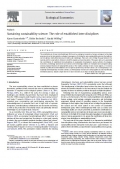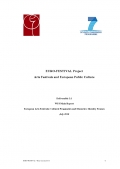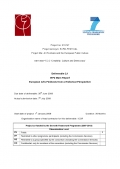Uploaded by Ivan Montenegro Perini 5334 days ago Number of pages: 9 File's language: English Views: 1753
The establishment of new interdisciplinary fields such as ecological economics, human ecology or technology assessment can be interpreted as a logical consequence of striving for new sustainability sciences that address current global, multi-dimensional and multi-scale challenges. These set out to bridge the gap between the natural and the social sphere, between scientific analysis and societal action. This paper aims at re-assessing the contribution of established inter-disciplines to sustainable development. Journal articles of ecological economics, technology assessment and science and technology studies are evaluated and compared along several proposed features of sustainability science. The results converge in two crucial aspects. (1) Concise societal or political recommendations are not part of present day ‘normal science’, be it a disciplinary or an explicitly interdisciplinary research context. (2) Participatory exercises are rarely applied as a socio-politically embedded practice, despite a high interest in such exercises as an object of study and discussion.
 Youth, Unemployment, and Exclusion in Europe: A Multidimensional Approach to Understanding the Conditions and Prospects for Social and Political Integration of Young Unemployed
Youth, Unemployment, and Exclusion in Europe: A Multidimensional Approach to Understanding the Conditions and Prospects for Social and Political Integration of Young Unemployed Climate change, hydro-conflicts and human security: Achievements of and Gaps in current policies
Climate change, hydro-conflicts and human security: Achievements of and Gaps in current policies Sustaining sustainability science: The role of established inter-disciplines
Sustaining sustainability science: The role of established inter-disciplines European Arts Festivals: Cultural Pragmatics and Discursive Identity Frames
European Arts Festivals: Cultural Pragmatics and Discursive Identity Frames European Arts Festivals from a Historical Perspective
European Arts Festivals from a Historical Perspective European Public Culture and Aesthetic Cosmopolitanism
European Public Culture and Aesthetic Cosmopolitanism
iKNOW has been featured in the media and several research projects:
DIE ZEIT (Germany), Financial Times (Germany), El Heraldo (Colombia), Prospective Foresight Network (France), Nationalencyklopedin (Sweden), EFP - European Foresight Platform (EC), EULAKS - European Union & Latin America Knowledge Society (EC), CfWI - Centre for Workforce Intellience (UK), INFU - Innovation Futures (EC), Towards A Future Internet (EC), dstl - Defence S&T Laboratory (UK), EFSA - European Food Safety Agency (EU), Malaysia Foresight Programme (Malaysia), Bulletins Electroniques more...
